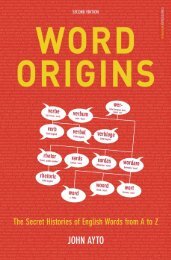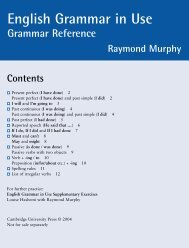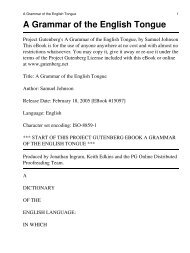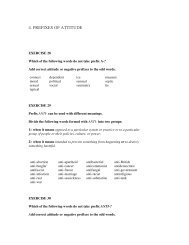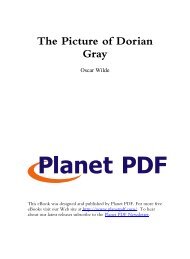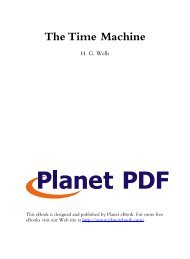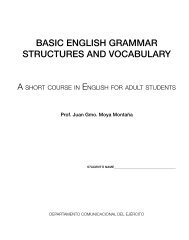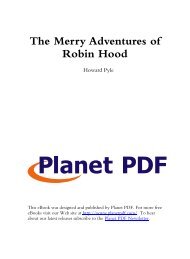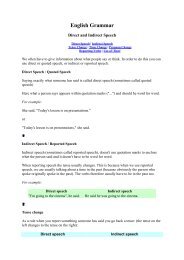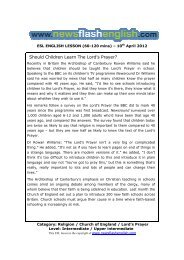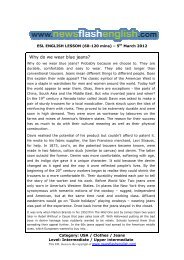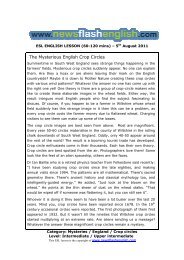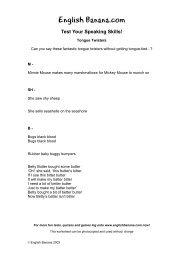GRAMMARCLEAR;The profits the college made from the rodeo werelarge, an observation which the faculty madealmost immediately. (A specific antecedent[observation] is created for the pronoun which).VAGUE REFERENCE:He was fair, and he went out of his way to helphis students by keeping extensive office hours andby conducting long tutorial sessions on his owntime. This made him very popular.CLEAR:He was popular because he was fair, and he wentout of his way to help his students by keepingextensive office hours and by conducting longtutorial sessions on his own time. (The pronoun iseliminated entirely).CLEAR:His being fair and going out of his way to help hisstudents made him very popular. [The pronoun iseliminated entirely).VAGUE REFERENCE:The government finally enacted changes in thecapital gains tax, but it took time.CLEAR:The government finally enacted changes in thecapital gains tax, but such legislation took time.(The pronoun is eliminated entirely).CLEAR:The government's finally enacting changes in thecapital gains tax took time. (The pronoun iseliminated entirely).19B Avoid sentences in which there are two ormore possible antecedents for a pronounAMBIGUOUS REFERENCE:Logan told Smith that he was a crook. [Does herefer to Logan or Smith?)CLEAR:Logan said to Smith, "You are a crook."CLEAR:Logan said to Smith, "I am a crook."CLEAR:Logan admitted to Smith that he was a crook,CLEAR:Logan accused Smith of being a crook,AMBIGUOUS REFERENCE:My children collected so many aluminum cans thatI got rid of them. (Does them refer to the childrenor the cans?)Note: The fact that it is common sense that the writer discardedthe cans rather than the children does not reducethe ambiguity. The reader still has to make a choice he orshe should not be required to make.CLEAR:I got rid of the aluminum cans that my childrencollected.19C Avoid references to inaccessible or distantantecedentsINACCESSIBLE:The law books are housed in a gleaming newlibrary with electronic retrieval chutes, personalelevators to the ten stack levels, and student aideswho will fetch and carry for ail the visitingscholars. They are color coded according tofunction. (The pronoun they is too far removedfrom its antecedent books}.INACCESSIBLE:Flocks of Canada Geese gathered on the old farmin the midst of the bright reds, oranges, andyellows that marked the arrival of autumn. Theywere usually grouped in gaggles of nine or ten.(The pronoun they is too far removed from itsantecedent flocks].19D Be careful to use the relative pronoun who,which, and that for suitable antecedentsAlways use the relative pronoun who to refer to personsand, sometimes, close family pets or named animals.Mayberry is the police officer who walks the beatin Reseda.The woman who started the feminist movementbecame very bitter.Lassie is the collie who crossed a continent to findher owner.The pronoun which is generally used to refer to animalsand things.The Los Angeles River, which is almost always dry,can become fierce and deadly during the rainyseason.The pronoun that refers to animals and common nouns.The face mar launched a thousand ships belongedto Helen of Troy.The animal that most people fear is the boaconstrictor.The pronoun whose almost always refers to people, but itis occasionally used to refer to animals and things toavoid an awkward or convoluted sentence.The plane whose landing gear jammed will run outof fuel at 14:42.The lion wfiose mane became stuck in the gatewas protesting mightily.30
20SENTENCE STRUCTURE20A Simple sentencesA sentence is a group of words with a subject and predicateexpressing one complete thought.orThe infant smiled.Mary fried the eggs.The subject names the noun or pronoun doing the actionor being written about, such as Mary in the sentenceabove. The predicate, fried the eggs, includes the verband any of its complements or modifiers.The simple sentence has other names: independentclause is the most common, although simple clause is frequentlyused. Dependent clauses are sentences that havebeen slightly altered so that they cannot stand alone(because their meaning is incomplete), but must beattached to an independent clause, where they actually actas a noun, adjective, or an adverb. Such dependent clausesare also known as subordinate clauses. The act of placingan idea in a dependent clause is called subordination.Mary fried the eggsIndependent Clausewhich her son had brought from the hen house.Dependent Clause (Adjecfive Clause)Mary fried the eggsIndependent Clausewhen her family finally came downstairs.Dependent Clause (Advert Clause)Mary knew that they all were very hungry.Independent Clause Dependent Clause (Noun Clause)20B Complex sentencesAny combination of independent clauses and dependentclauses, such as the three examples above, is known as acomplex sentence. It is important to keep in mind theeffect and importance of subordination in writing.Subordinate clauses carry a great deal of in<strong>format</strong>ion andmeaning, and yet allow the"subject and verb named inthe independent clause to remain dominant and visible asthe main idea.20C Compound sentencesThe compound sentence consists of at least two simplesentences joined by means of a coordinating conjunction,and, but, for, or, and yet. Independent clauses joined inthis manner are given equal emphasis, a process which iscalled coordination.Mary fried the eggs, and she set out great slabs ofhot sourdough toast.President Bush improved our reputation overseas,and he dispelled any doubts about Americanmilitary prowess.Again, it is important to be aware of the effect of coordinationon your message. With coordination, you are givingequal emphasis to each clause and to each idea thatclause communicates. Semicolons and conjunctiveadverbs like therefore, nevertheless, although, however,yet, or consequently can also be used to join and coordinateclauses. Writing a succession of separate sentencesis also a kind of coordination, but, without some subordination,it often results in muddied communication, theresult of too many main ideas.The three sentence structures, simple, complex, and compound,are practical tools that a thoughtful writer uses toshape his thoughts as he develops them. They complementand balance each other in the paragraph. They preventmonotony and permit refreshing combinations of ideas.20D Basic sentence patternsThe simple sentence, while it is the basic building elementin the process of writing, is really not quite so simple.Its versatility is reflected in the fact that it canassume three basic patterns:1. PATTERN I: N VINTRANSITIVE.The bully laughed.Pattern I sentences are always built around intransitiveverbs, that is, verbs that do not require a word of completionlike a direct object. They give emphasis to the actionof the subject. Note that the modification of the verbdoes not change the pattern. Other examples of Pattern I:George shaves every morning.Mary studied all through the night.Most animals migrate to warmer climates.The severe judge finally smiled.2. PATTERN II: N VTRANSITIVE NDIRECT OBJECT,Raul ate a Big Mac.Pattern II sentences are always built around transitiveverbs, that is, verbs that do require a completer or directobject. Pattern II sentences emphasize the transfer ofaction from the subject to the receiver of the action,called the direct object. Other Pattern II sentences:Elizabeth sheared the sheep.William's arrow hit the bullseye.Biff carved the turkey.Amir rejected the offer.3. PATTERN IIA:N VTRANSITIVE VERB NINDIRECT NDIRECTsend OBJECT OBJECT.showgivetellmakeJohn made Piper a slingshot.Pattern IIA is a variation of Pattern II. The sentence centersaround a transitive verb, but the transitive verb is aspecialized verb like send, show, tell, give, make, andmore. Specialized transitive verbs like give permit thewriter or speaker to include a secondary receiver of theaction after the transitive verb and before the directobject. These secondary receivers of the action are calledindirect objects.Fred made Lydia a cup of coffee.sub|BcE transitive indirect directv*rb object object31



